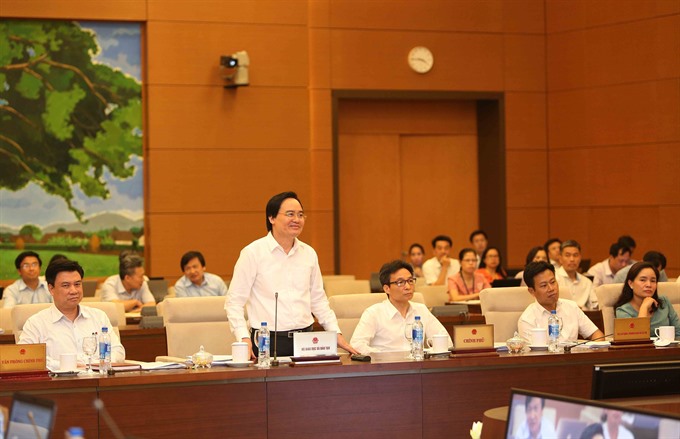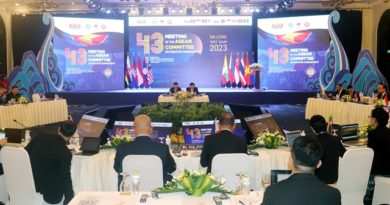EDU-LAW: HÀ NỘI – National Assembly (NA) Standing Committee suggests poll on education law
Minister of Education and Training Phùng Xuân Nhạ spoke at the National Assembly Standing Committee’s yesterday afternoon meeting, where delegates discussed revisions to the education law. — VNA/VNS Photo
.
.
HÀ NỘI — Members of the National Assembly Standing Committee said there is a need to collect feedback from the general population and incorporate them into the draft of the revised education law.
The suggestion was made in yesterday’s meeting of the committee in their 26th working session, following recent discoveries of score manipulation schemes in northern mountainous provinces in the national high school exam.
NA Chairwoman Nguyễn Thị Kim Ngân commented that the debates surrounding the exam, considered the most important test in a Vietnamese student’s life, has shown why conducting a nationwide survey is “unavoidable” as the issue is “affecting every household.”
Opinion is split over whether a single high-stakes national high school exam is needed. Those in favour of the exam argue that it is the benchmark to measure knowledge acquisition, allow higher education institutes to choose capable students and provide needed data for the education authorities in their decision-making.
The other side argues that the country should abolish the national exam altogether and grant the high school graduation diploma based on the student’s academic performance, to reduce the pressure and costs.
Other deputies suggested a two-tier exam system, in which the current national high school exam will still be held and the results can be used as reference during universities’ application review, but the universities can still hold their own exam if need be.
Stressing the far-reaching implications of the revised draft law, Nguyễn Hạnh Phúc, NA Secretary General, asked to delay the NA general vote until next year in order to have more time to prepare the draft law and showcase “the National Assembly’s prudence in the search for solutions.”
At the meeting, the Standing Committee also discussed the revised law on higher education. They stressed the need for the draft law to provide for greater autonomy of tertiary education institutions, especially in important areas such as budget use, human resources, determination of tuition fees and other costs – which means reduced central control over the universities’ activities, in line with international practices.
However, NA deputies also asked for policy mechanisms that ensure the education institutions will be held accountable should they fail to fulfill their quality commitments.
Eight bills
The NA Standing Committee began this month’s agenda earlier yesterday, and it plans to discuss eight bills during the 3-day agenda.
Aside from the Law on Education, other laws that will be discussed are those on the People’s Public Security Force, Amnesty and Anti-Corruption, the draft laws on livestock, cultivation, amendments and supplements to the Law on Higher Education and the draft law on Architecture.
The full draft law on Architecture is set to go on the NA’s agenda in November for the first time while the other seven bills were discussed in May.
In a surprise, the draft law on Special Administrative-Economic Units, also known as special economic zones – SEZs at Vân Đồn, Bắc Vân Phong and Phú Quốc, was not included in the August agenda.
Committee meetings set for September and October have no plans to look into the draft law either as public comments on the draft law on SEZs are still being collected, according to NA General Secretary Nguyễn Hạnh Phúc.
A proposed regulation in the draft law on SEZs which allowed land leases of up to 99 years sparked mass protests in June.
Therefore, the NA in May this year delayed a vote for the draft law until its next meeting in November to have more time to consult lawmakers, voters and the general public.
Also during this month’s meeting, legislators will comment on a draft decree stipulating the functions, tasks, powers and organisational structure of the State capital management committee at enterprises and internal adjustments of the State budget spending estimate allocated in 2017 to supplement the 2018 expenditure.
They will give opinions on the assignment of capital investment plans for ministries and sectors and supplementation of the middle-term public investment plan in 2016-2020.
The NA Standing Committee will consider the appointment of members of the national councils on selection of judges and procurators at the Supreme People’s Procuracy.
The committee will also examine the implementation of policies and laws on the management and use of foreign loans between 2011 and 2016.
The NA Standing Committee will see Minister, Chairman of Committee for Ethnic Minority Affairs Đỗ Văn Chiến and Minister of Defence Tô Lâm undergo Q&A sessions.
Chiến will face questions relating to implementations of policies for ethnic groups, especially those about social welfares, infrastructure development, job training and creation.
Lâm is expected to talk about social security and orders, crime fighting and preventions, crimes relating to economic activities, power abuse and the development of a national resident database.
The NA Standing Committee discussed amendments of the Law on Amnesty yesterday morning.
NA Judicial Committee chairwoman Lê Thị Nga said the committee agreed with the Government’s proposal to continue granting amnesty during important national events, anniversaries and in special cases.
She said it was not necessary to clarify the time in more detail as the State President can follow the law and base his amnesty decisions on the country’s conditions.
The Judicial Committee also asked for amnesty for persons temporarily suspended from serving their imprisonment penalties if they fully meet requirements imposed for jailed persons and follow the law while under probation.
Under the current amnesty law, amnesty is granted for persons who are sentenced to a term of imprisonment or life imprisonment.
In special cases, the State President shall decide to grant special amnesty to persons sentenced to a imprisonment who are eligible for postponement of, or suspension from, serving their penalties.
In the last ten years, only 14 persons received amnesty in special cases as the State responded to internal and external affairs. — VNS
 All photographs, news, editorials, opinions, information, data, others have been taken from the Internet..aseanews.net | [email protected] / For comments, Email to : Aseanews.Net |
All photographs, news, editorials, opinions, information, data, others have been taken from the Internet..aseanews.net | [email protected] / For comments, Email to : Aseanews.Net |









